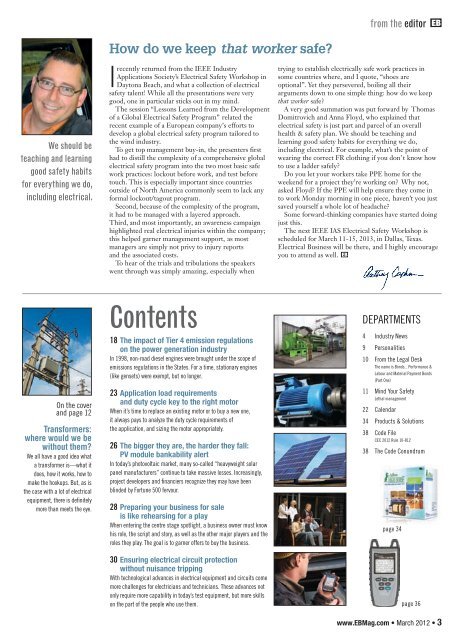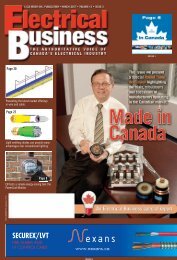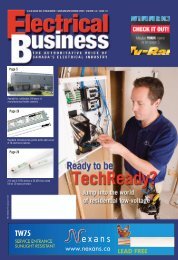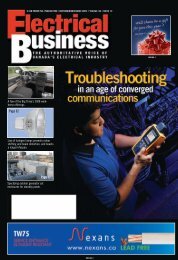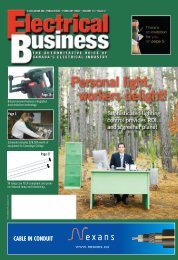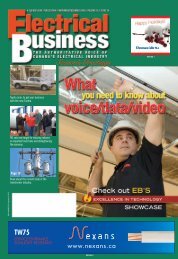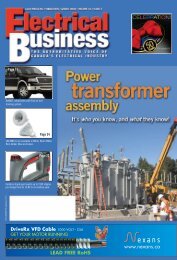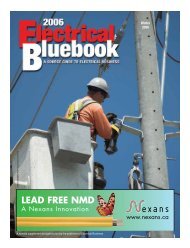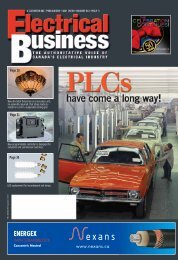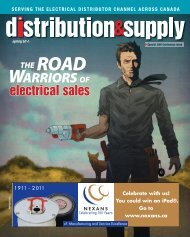where would we be without them? - Electrical Business Magazine
where would we be without them? - Electrical Business Magazine
where would we be without them? - Electrical Business Magazine
Create successful ePaper yourself
Turn your PDF publications into a flip-book with our unique Google optimized e-Paper software.
from the editor<br />
We should <strong>be</strong><br />
teaching and learning<br />
good safety habits<br />
for everything <strong>we</strong> do,<br />
including electrical.<br />
How do <strong>we</strong> keep that worker safe?<br />
I<br />
recently returned from the IEEE Industry<br />
Applications Society’s <strong>Electrical</strong> Safety Workshop in<br />
Daytona Beach, and what a collection of electrical<br />
safety talent! While all the presentations <strong>we</strong>re very<br />
good, one in particular sticks out in my mind.<br />
The session “Lessons Learned from the Development<br />
of a Global <strong>Electrical</strong> Safety Program” related the<br />
recent example of a European company’s efforts to<br />
develop a global electrical safety program tailored to<br />
the wind industry.<br />
To get top management buy-in, the presenters first<br />
had to distill the complexity of a comprehensive global<br />
electrical safety program into the two most basic safe<br />
work practices: lockout <strong>be</strong>fore work, and test <strong>be</strong>fore<br />
touch. This is especially important since countries<br />
outside of North America commonly seem to lack any<br />
formal lockout/tagout program.<br />
Second, <strong>be</strong>cause of the complexity of the program,<br />
it had to <strong>be</strong> managed with a layered approach.<br />
Third, and most importantly, an awareness campaign<br />
highlighted real electrical injuries within the company;<br />
this helped garner management support, as most<br />
managers are simply not privy to injury reports<br />
and the associated costs.<br />
To hear of the trials and tribulations the speakers<br />
<strong>we</strong>nt through was simply amazing, especially when<br />
trying to establish electrically safe work practices in<br />
some countries <strong>where</strong>, and I quote, “shoes are<br />
optional”. Yet they persevered, boiling all their<br />
arguments down to one simple thing: how do <strong>we</strong> keep<br />
that worker safe?<br />
A very good summation was put forward by Thomas<br />
Domitrovich and Anna Floyd, who explained that<br />
electrical safety is just part and parcel of an overall<br />
health & safety plan. We should <strong>be</strong> teaching and<br />
learning good safety habits for everything <strong>we</strong> do,<br />
including electrical. For example, what’s the point of<br />
<strong>we</strong>aring the correct FR clothing if you don’t know how<br />
to use a ladder safely?<br />
Do you let your workers take PPE home for the<br />
<strong>we</strong>ekend for a project they’re working on? Why not,<br />
asked Floyd? If the PPE will help ensure they come in<br />
to work Monday morning in one piece, haven’t you just<br />
saved yourself a whole lot of headache?<br />
Some forward-thinking companies have started doing<br />
just this.<br />
The next IEEE IAS <strong>Electrical</strong> Safety Workshop is<br />
scheduled for March 11-15, 2013, in Dallas, Texas.<br />
<strong>Electrical</strong> <strong>Business</strong> will <strong>be</strong> there, and I highly encourage<br />
you to attend as <strong>we</strong>ll.<br />
On the cover<br />
and page 12<br />
Transformers:<br />
<strong>where</strong> <strong>would</strong> <strong>we</strong> <strong>be</strong><br />
<strong>without</strong> <strong>them</strong>?<br />
We all have a good idea what<br />
a transformer is—what it<br />
does, how it works, how to<br />
make the hookups. But, as is<br />
the case with a lot of electrical<br />
equipment, there is definitely<br />
more than meets the eye.<br />
Contents<br />
18 The impact of Tier 4 emission regulations<br />
on the po<strong>we</strong>r generation industry<br />
In 1998, non-road diesel engines <strong>we</strong>re brought under the scope of<br />
emissions regulations in the States. For a time, stationary engines<br />
(like gensets) <strong>we</strong>re exempt, but no longer.<br />
23 Application load requirements<br />
and duty cycle key to the right motor<br />
When it’s time to replace an existing motor or to buy a new one,<br />
it always pays to analyze the duty cycle requirements of<br />
the application, and sizing the motor appropriately.<br />
26 The bigger they are, the harder they fall:<br />
PV module bankability alert<br />
In today’s photovoltaic market, many so-called “heavy<strong>we</strong>ight solar<br />
panel manufacturers” continue to take massive losses. Increasingly,<br />
project developers and financiers recognize they may have <strong>be</strong>en<br />
blinded by Fortune 500 fervour.<br />
28 Preparing your business for sale<br />
is like rehearsing for a play<br />
When entering the centre stage spotlight, a business owner must know<br />
his role, the script and story, as <strong>we</strong>ll as the other major players and the<br />
roles they play. The goal is to garner offers to buy the business.<br />
30 Ensuring electrical circuit protection<br />
<strong>without</strong> nuisance tripping<br />
With technological advances in electrical equipment and circuits come<br />
more challenges for electricians and technicians. These advances not<br />
only require more capability in today’s test equipment, but more skills<br />
on the part of the people who use <strong>them</strong>.<br />
DEPARTMENTS<br />
4 Industry News<br />
9 Personalities<br />
10 From the Legal Desk<br />
The name is Bonds... Performance &<br />
Labour and Material Payment Bonds<br />
(Part One)<br />
11 Mind Your Safety<br />
Lethal management<br />
22 Calendar<br />
34 Products & Solutions<br />
38 Code File<br />
CEC 2012 Rule 10-812<br />
38 The Code Conundrum<br />
page 34<br />
page 36<br />
www.EBMag.com • March 2012 • 3


